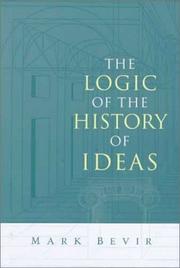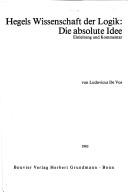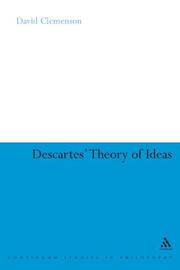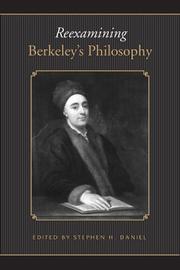| Listing 1 - 8 of 8 |
Sort by
|
Book
ISBN: 0192830287 Year: 1981 Publisher: London Oxford university
Abstract | Keywords | Export | Availability | Bookmark
 Loading...
Loading...Choose an application
- Reference Manager
- EndNote
- RefWorks (Direct export to RefWorks)
Philosophy --- Idea (Philosophy) --- Philosophie --- Idée (Philosophie) --- Idée (Philosophie)

ISBN: 0521640342 0521016843 1107111196 0511171846 0511003471 0511149247 051132314X 0511490445 1280432365 0511051360 9780511003479 9780511149245 9780511051364 9780521640343 9780511490446 9780521016841 9781107111196 9781280432361 9780511171840 Year: 2002 Publisher: Cambridge Cambridge University press
Abstract | Keywords | Export | Availability | Bookmark
 Loading...
Loading...Choose an application
- Reference Manager
- EndNote
- RefWorks (Direct export to RefWorks)
Human cultures generate meanings, and the history of ideas, broadly conceived, is the study of these meanings. An adequate theory of culture must therefore rest on a suitable philosophical enquiry into the nature of the history of ideas. Mark Bevir's book explores the forms of reasoning appropriate to the history of ideas, enhancing our understanding by grappling with central questions such as: What is a meaning? What constitutes objective knowledge of the past? What are beliefs and traditions? How can we explain why people held the beliefs they did? The book ranges widely over issues and theorists associated with post-analytic philosophy, post-modernism, hermeneutics, literary theory, political thought, and social theory.
Idea (Philosophy) --- Idée (Philosophie) --- History. --- Histoire --- Philosophy --- Social Sciences --- Political Science
Book

ISBN: 2271063981 2271141907 9782271063984 Year: 2022 Publisher: Paris : CNRS Éditions,
Abstract | Keywords | Export | Availability | Bookmark
 Loading...
Loading...Choose an application
- Reference Manager
- EndNote
- RefWorks (Direct export to RefWorks)
L’ouvrage propose une approche synthétique sur un enjeu majeur de la philosophie moderne : le statut de l’idée et l’introduction de l’idéalisme à partir de la problématisation de la notion de représentation. Son enjeu est d’interroger, de ressaisir dans sa genèse, et de critiquer une thèse habituellement associée au problème de la connaissance à l’époque moderne, suivant laquelle l’idée est la médiation nécessaire entre la chose et l’esprit. Le volume débute par la philosophie classique et les premiers éléments de la scolastique légués à la modernité, et il rejoint les enjeux actuels de la philosophie analytique. Il est distribué en deux grandes parties consacrées à l’ancrage classique de la question, puis à ses requalifications depuis le XVIIIe siècle, essentiellement dans les textes de langue anglaise mais aussi chez Diderot. Le trajet proposé conduit de la conceptualisation cartésienne de l’idée et de sa fonction représentative, à l’examen des rapports entre sensation et représentation dans la philosophie de langue anglaise et, enfin, à la critique de l’idéalisme dans les théories du réalisme direct au XXe siècle.
Idea (Philosophy) --- Idealism --- Representation (Philosophy) --- Idée (Philosophie) --- Idéalisme --- Représentation (Philosophie) --- Philosophical studies --- 21st century --- Idée (Philosophie) --- Idéalisme --- Représentation (Philosophie) --- Philosophy --- représentation --- XVIIe-XXe siècle --- idée
Book
ISBN: 2859398376 2757426842 9782859398378 Year: 2004 Volume: 16 Publisher: Villeneuve d'Ascq : Presses Universitaires du Septentrion,
Abstract | Keywords | Export | Availability | Bookmark
 Loading...
Loading...Choose an application
- Reference Manager
- EndNote
- RefWorks (Direct export to RefWorks)
Cette étude porte sur la Platos Ideenlehre, la grande monographie que Natorp – l’un des principaux représentants avec H. Cohen et E. Cassirer de l’École de Marbourg – consacra en 1903 à Platon. Toute la difficulté (et tout l’intérêt) de cette monographie tient à l’ambiguïté de la stratégie interprétative adoptée par son auteur : la théorie des Idées est certes conçue comme l’origine historique de la méthode transcendantale établie par Kant dans la première Critique, mais la lecture que Natorp propose du texte platonicien est surtout pour lui l’occasion d’élaborer une conception originale de l’idéalisme critique qui se démarque sur certains points fondamentaux de la lettre kantienne. En ce sens, la lecture des Dialogues consiste moins à repérer les prémisses d’une doctrine constituée en dehors d’eux qu’à résoudre les deux problèmes majeurs de tout idéalisme véritable. Premièrement, comment concevoir l’articulation entre la discursivité logique et la réceptivité sensible sans mettre cette dernière au compte d’une faculté radicalement étrangère à la pensée ? Platon est précisément aux yeux de Natorp celui qui s’efforce de comprendre « la nature étrangère à la forme » non comme une altérité absolue, un datum extra-logique, mais comme l’autre qui est propre à la pensée. Deuxièmement, que signifie « être » pour l’Idée ? Platon a clairement reconnu selon Natorp l’impossibilité de concevoir cet être comme une existence donnée : la pensée comme procès dialectique est au contraire originaire et l’Idée comme hypothèse ou position discrète ne reçoit de consistance qu’au sein de la continuité pure du dialegesthai.
Idea (Philosophy) --- Philosophy, Ancient --- Idée (Philosophie) --- Philosophie ancienne --- Natorp, Paul, --- Plato --- Idée (Philosophie) --- Plato. --- Platonists --- Germany --- Natorp, Paul --- Platonic philosophy --- Ideas, Theory of --- Ideas (Philosophy) --- Theory of ideas --- Knowledge, Theory of --- Philosophy --- Memetics --- Natorp, Paul, - 1854-1924

ISBN: 3416017420 9783416017428 Year: 1983 Volume: 180 Publisher: Bonn Bouvier
Abstract | Keywords | Export | Availability | Bookmark
 Loading...
Loading...Choose an application
- Reference Manager
- EndNote
- RefWorks (Direct export to RefWorks)
Logic --- Hegel, Georg W.F. --- Idea (Philosophy) --- Logic, Modern --- Idée (Philosophie) --- Logique moderne --- History --- Histoire --- Hegel, Georg Wilhelm Friedrich, --- 1 HEGEL, GEORG WILHELM FRIEDRICH --- #GROL:SEMI-1-05'18' Hege --- -Idea (Philosophy) --- -Ideas, Theory of --- Ideas (Philosophy) --- Theory of ideas --- Knowledge, Theory of --- Philosophy --- Memetics --- Modern logic --- Filosofie. Psychologie--HEGEL, GEORG WILHELM FRIEDRICH --- -Hegel, Georg Wilhelm Friedrich --- -Filosofie. Psychologie--HEGEL, GEORG WILHELM FRIEDRICH --- 1 HEGEL, GEORG WILHELM FRIEDRICH Filosofie. Psychologie--HEGEL, GEORG WILHELM FRIEDRICH --- Hegel, Giorgio Guglielmo Frederico --- -Modern logic --- Ideas, Theory of --- Idée (Philosophie) --- Hegel, Georg Wilhelm Friedrich --- Logic [Modern ] --- 19th century --- Logic, Modern - 19th century --- Idea (Philosophy) - History - 19th century --- Hegel, Georg Wilhelm Friedrich, - 1770-1831 - Wissenschaft der Logik
Periodical
ISSN: 00225037 10863222 Year: 1940 Publisher: Philadelphia University of Pennsylvania Press.
Abstract | Keywords | Export | Availability | Bookmark
 Loading...
Loading...Choose an application
- Reference Manager
- EndNote
- RefWorks (Direct export to RefWorks)
Since its inception in 1940, the Journal of the History of Ideas (JHI) has served as a medium for the publication of research in intellectual history that is of common interest to scholars and students in a wide range of fields. It is committed to encouraging diversity in regional coverage, chronological range, and methodological approaches. JHI defines intellectual history expansively and ecumenically, including the histories of philosophy, of literature and the arts, of the natural and social sciences, of religion, and of political thought. It also encourages scholarship at the intersections of cultural and intellectual history -- for example, the history of the book and of visual culture.
History of philosophy --- Theory of knowledge --- epistomologie --- epistemologists --- Literature --- Philosophy --- Idea (Philosophy) --- Philosophie --- Idée (Philosophie) --- Periodicals --- Périodiques --- Histoire --- Philosophy. --- #FHIW:CAT1 --- #A50018 --- Arts and Humanities --- General and Others --- Arts and Humanities. --- General and Others. --- Idée (Philosophie) --- Périodiques --- EBSCOASP-E EJPHILO EPUB-ALPHA-J EPUB-PER-FT JSTOR-E --- Kennisleer --- Geschiedenis van de filosofie --- Letterkunde --- epistomologen --- Intellectual History. --- Mental philosophy --- Humanities --- Philosophy - Periodicals --- Philosophie - Histoire - Périodiques --- Vie intellectuelle --- metaphysics --- history of philosophy --- Arabian philosophy --- Claude de Seyssel --- William Harvey --- Christian Thomasius --- Edmund Burke --- Louis-Claude de Saint-Martin --- David Hume --- nineteenth century --- Iran --- raciality --- human nature --- Filosofia --- Història

ISBN: 9780826487735 0826487734 Year: 2007 Volume: *14 Publisher: London Continuum
Abstract | Keywords | Export | Availability | Bookmark
 Loading...
Loading...Choose an application
- Reference Manager
- EndNote
- RefWorks (Direct export to RefWorks)
Idea (Philosophy) --- Descartes, René, --- Knowledge, Theory of. --- Representation (Philosophy) --- Representationalism (Philosophy) --- Representationism (Philosophy) --- Culture --- Philosophy --- Epistemology --- Theory of knowledge --- Psychology --- Descartes, Rene, --- Cartes, Renate des, --- Cartesio, --- Cartesius, Renatus, --- Dekart, René, --- Dekaruto, --- Des Cartes, --- Des Cartes, Renate, --- Des-Cartes, Renati, --- Des Cartes, René, --- Descartes, Renatus, --- Dikaer, --- Dikaer, Lenai, --- Dīkārt, --- Dīkārtīyah, --- Kartezjusz, --- דקרט, רנה, --- דיקרט, רנה --- דיקרט, רנה, --- デカルト, --- Descartes, Renatus --- Cartesius, Renatus --- Ideas, Theory of --- Ideas (Philosophy) --- Theory of ideas --- Knowledge, Theory of --- Memetics --- Descartes, René, --- Descartes, René --- Idée (philosophie) --- Métaphysique --- Idée (philosophie) --- Métaphysique

ISBN: 1442684755 9781442684751 9780802093486 0802093485 Year: 2007 Publisher: Toronto
Abstract | Keywords | Export | Availability | Bookmark
 Loading...
Loading...Choose an application
- Reference Manager
- EndNote
- RefWorks (Direct export to RefWorks)
Ultimately, this volume represents a major contribution to the study of Berkeley's philosophy by critiquing the tendency to generalize his thought as a version of theologically modified solipsism. In this way, it is a unique and invaluable addition to Berkeley scholarship.
Idealism. --- Idea (Philosophy) --- Realism. --- Thought and thinking. --- Immaterialism (Philosophy) --- Idéalisme. --- Idée (Philosophie) --- Réalisme. --- Pensée. --- Immatérialisme (Philosophie) --- Immateriality (Philosophy) --- Concepts --- Idealism --- Philosophy --- Spiritualism (Philosophy) --- Substance (Philosophy) --- Universals (Philosophy) --- Mind --- Thinking --- Thoughts --- Educational psychology --- Psychology --- Intellect --- Logic --- Perception --- Psycholinguistics --- Self --- Empiricism --- Conceptualism --- Dualism --- Materialism --- Nominalism --- Positivism --- Rationalism --- Ideas, Theory of --- Ideas (Philosophy) --- Theory of ideas --- Knowledge, Theory of --- Memetics --- Animism --- Monism --- Personalism --- Realism --- Transcendentalism --- Berkeley, George, --- Berkeley, George --- G. B. --- B., G. --- Berkley, George, --- Author of The minute philosopher, --- Minute philosopher, Author of the, --- Cloyne, --- Berkeley, --- Member of the established church, --- בערקלי, דזשארדזש, --- Author of Siris, --- Idealisme. --- Idee (Philosophie) --- Realisme. --- Pensee. --- Immaterialisme (Philosophie)
| Listing 1 - 8 of 8 |
Sort by
|

 Search
Search Feedback
Feedback About UniCat
About UniCat  Help
Help News
News